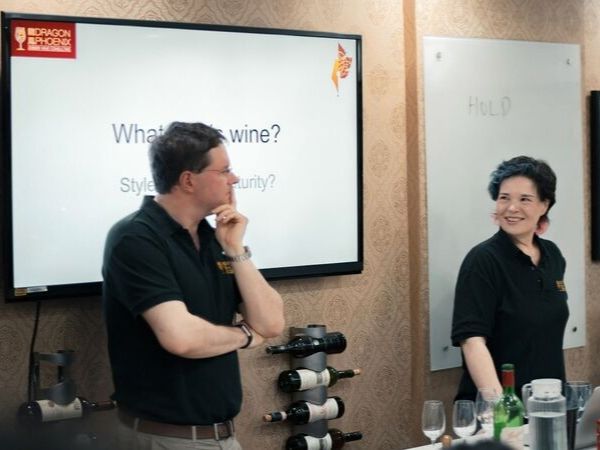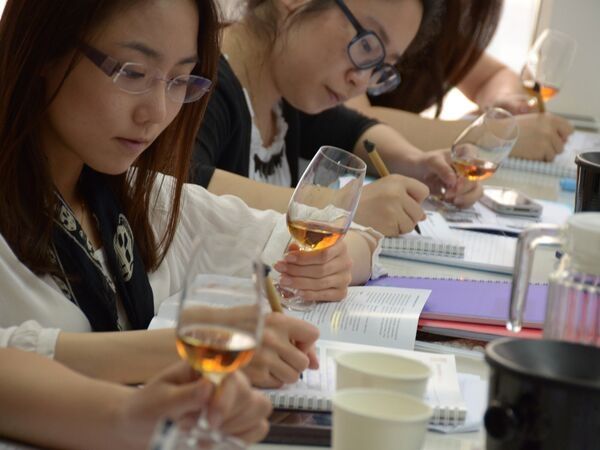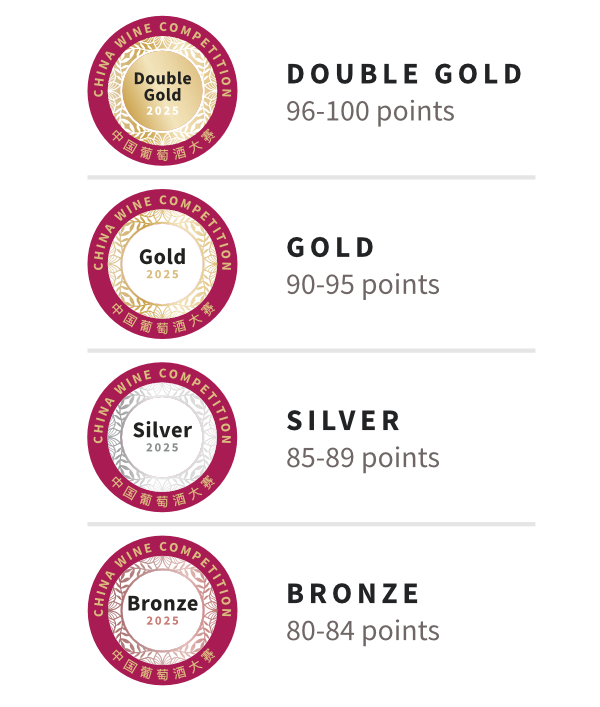November 10 , 2026, Hong Kong

Meet Edward Ragg - Master of Wine and Co-founder of Dragon Phoenix Wine Consulting.
As China currently celebrates the 70th Anniversary of the founding of the People’s Republic, the world of wine looks increasingly to this unique market whose imported wine sector traces it origins to as recently as the early 1990s. But what is really happening in this fast-paced, challenging market today?
Meet Edward Ragg, Master of Wine and Co-founder, with Fongyee Walker MW, of Dragon Phoenix Wine Consulting (www.dpclass.cn). As well as working as a wine educator, Edward is also an award-winning poet, critic, and wine writer who has resided in Beijing since 2007.
In a chat with our Editor-In-Chief, Ragg shares his experience of the wine industry, Dragon Phoenix’s evolution and what to expect of China’s future:
1. Tell us about your journey in the wine industry. Where did you start from?
There was wine in my family: Swiss cousins making Chasselas and Pinot Noir in the Vaud and also my older brother Michael who worked in the London wine trade for many years before moving out to Burgundy in 2003 to set up a negociant and domaine business called Mischief & Mayhem. So these were definitely inspirations! My early interest in wine also stemmed from a friend whose family lived in Sauternes as well as a trip around the Hunter Valley when I was eighteen: which really got me hooked! Then at Oxford University, I was a member of the Oxford Wine Circle - fortunately far less exclusive than it sounds - but only began to blind-taste seriously as a graduate student at Cambridge. I used to run the Cambridge University Blind Wine Tasting Society (CUBWTS) with my wife, Fongyee, and we were both Captains of the Cambridge team as well as writing a guide to blind tasting for CUBWTS, which I still revise each year. But it was only when I moved to China, with Fongyee, in early 2007, that I became involved in wine professionally: setting up Dragon Phoenix Wine Consulting (www.dpclass.cn) in Beijing in late 2007. This was probably the first fully independent wine education service in mainland China. We started teaching WSET courses in early 2008 and have grown ever since, pioneering our own wine courses and opening classrooms in Beijing, Shanghai, Chengdu, Chongqing, Dalian, Shenyang and other cities.
2. What inspired you to go ahead for the Master of Wine title?
I saw what a tremendous difference Master of Wine studies had made to Fongyee. She began the programme a few years before me and was clearly learning so much! I was acutely aware of how it strengthened her natural capacities as a taster. When we’d teach together, whether it was a WSET Level 3 course - or later on when we started teaching WSET Diploma - I could see how the MW had helped her refine her tasting logic, vocabulary and overall understanding of wine. She was working on her research paper when I applied to the IMW in 2015. So she was definitely a big inspiration! There was also a number of our former students applying for the programme around that time. So I felt it was an important part of my professional development as a wine educator to get involved! Several MWs had also gone through the Oxford-Cambridge Varsity Match, such as James Simpson MW of Pol Roger. Both James, Bill Gunn MW and also the late Derek Smedley MW - who came to train us in Cambridge - were sources of inspiration, figures with great experience in the trade and remarkable palates. I also wanted to improve my level as a wine judge; and thought the Master of Wine could be useful for that too as well as gaining experience of competitions at the same time.
3. Tell us a little about Dragon Phoenix Wine Consulting. Where did the idea come from and what was your inspiration behind it?

[pictured: Edward & Fongyee teaching]
Fongyee and I had been working as academics in the UK as we began to engage with wine as general wine lovers. We knew we could teach and were wondering about opportunities to further our careers, perhaps in wine. However, the UK, although a great place to learn and taste, was jam-packed with wine educators! So we began to think about elsewhere. Fongyee had studied at Tsinghua University in Beijing in the mid-1990s; so she knew the city and, although she was teaching Classical Chinese at Cambridge, our feeling was that she could do more with her Chinese language skills. In 2006 we judged at the first rendition of the Shanghai International Wine Challenge and could see that there was demand for wine education, at least in China’s 1st-tier cities. So Dragon Phoenix was set up to specialise in education and also be fully independent and wholly owned by us. This was partly playing to our strengths as educators; but we also felt that being completely independent of the commercial handling of wine was really important in mainland China, especially back in 2007 when wine education was in its infancy. Fongyee’s Chinese name incorporates the character for ‘phoenix’. I’m a ‘dragon’ by year of birth; and, of course, we’re a married couple. So ‘Dragon Phoenix’ made a lot of sense to our Chinese audience!
4. Where do you see Dragon Phoenix Wine Consulting let's say 5 years down the line?
Haha! This is a tough one and a question I’m wary of attempting to answer given how quickly things can change in China. Consider, for example, how WeChat has only been around for about 7 years, but now has a billion users and has transformed contemporary Chinese life. But as we’re thinking about Dragon Phoenix specifically and not the tides and turns of the China market, my hope is that Dragon Phoenix continues to carve out its niche as the leading, independent wine education service in the mainland. We have a great team: three Masters of Wine - including Gus Zhu, the first Chinese national to become an MW - and many WSET Diploma holders. I have to say that educational quality is of paramount importance to us. So I’m always keen to maintain and improve on quality. You can only really do that at a certain size, in my view. Over the last twelve years of working in this market, umpteen people have approached us and asked what 'our plans for expansion' are: as if we were going to open 250 Dragon Phoenix classrooms all over the country over the next two years. But our ethos is to be small and focused. If we reach out to a wider audience, it tends to be online; and this is an area we are keen to develop. Having said that, you can’t beat being in a classroom with a really great wine educator and some classic wines in front of you!
Hear from Gus Zhu, The First Chinese Master Of Wine Talk About His Journey In The Wine Industry. Read Here
5. Could you share some of your study tips for when you were studying for the Master of Wine exam?
It’s very important to know what your weaknesses are in both tasting and theory. With theory, I knew I wasn’t a viticulturalist or winemaker or a bottling or shipping specialist: so I had to study for the 'technical papers’ (Papers 1-3) very carefully. I also haven’t been involved in the business of wine: and there is a whole theory paper on that. So I attempted to address gaps in my knowledge. Having said that, whilst the breadth of the syllabus looks demanding (and is), I realised that being able to apply critical analysis to an MW theory question and really answer the question asked of you was of overriding importance; rather than getting bogged down in an endless bibliography of possibilities. Wine, after all, is ever-changing and something you can study indefinitely! So it was important to know when to stop studying certain topics and then try to keep up to date on them. Some MW students are obsessed with collecting ‘examples’ to deploy in essays. You certainly need to be informed about a very wide range of topics covering the global wine industry. But there’s little point having lists of examples of things that don’t happen to integrate into an argument. And I always felt that if you took the theory topics seriously, you would naturally collect ‘examples’ along the way in any case. An essential part of the MW is also being able to think, argue and communicate clearly. So it’s important to practice writing essays to time with that in mind. There’s only so much you can say in a 50 minute essay which, ideally, should take about 10 minutes to plan and execute.
With the tasting exam, I spent a lot of time writing ‘dry tasting’ answers: that is, without physical wines. I did do practice ‘wet tasting’ and, as an educator, was lucky because I was opening wine all of the time. But I found it more useful to practice writing answers to different kinds of typical MW style questions for groups of wines, mainly classics, but also nominal outliers. Again, working on weaknesses was essential. I didn’t realise at first that I had tasting ‘blindspots’: struggling to identify Gruner Veltliner or Albarino, for example. So there was some physical tasting I had to work on too. In particular I had to work on calibration for sugar and alcohol levels across different wine styles. And you only get to understand those weaknesses by doing the wet tasting work.
All in all, identifying weaknesses and then working on those areas was really essential. And, finally, I’d say that time management in exams and keeping confident really helped too!

[pictured : Dragon Phoenix Wine Consulting Class in progress]
6. Where do you see the future of the Chinese wine industry in the next 10 years?
Gosh. If thinking about Dragon Phoenix in 5 years time is hard enough, this is a really challenging question! I do think, though, that wine education will continue to grow. Of the 700 WSET providers globally, 126 of them are in mainland China. And I see lots of opportunities for other forms of wine education or general wine education too. Additionally, China is already leading the world in ecommerce. So it’s possible that, as has been happening since 2013, ecommerce of wine will become more sophisticated and the range of wines available online will become increasingly diverse. I expect to see a greater interest in a wider range of wine styles. Admittedly, for the last decade, the assumption has been that China is a red wine market and will remain so. But when I was working on my MW research paper on the portfolio management strategies of major Chinese importers during 2008-2018 it became clear that there was new interest, at least by 2018, in white and pink wine, both still and sparkling, at various sweetness levels. Sparkling, although a tiny category in China, is likely to grow, especially in the inexpensive to mid-priced categories. That said, I don’t see mainland China becoming the kind of large-volume imported wine market that some people seem to think it will be. People have been ‘predicting’ this for years (even going back to the mid-2000s when the hype was infectious). But I don’t see any signs of it. Instead, mainland China will be specialised in a number of areas and not just in the fine wine game.
7. Do you think China is going to continue drinking a lot of imported wines? Or is the Chinese wine game going to change completely?
I don’t think China does drink a lot of imported wine, not relative to markets like the US, UK or Germany. You have to bear in mind that by year end 2018 mainland China only imported around 55 million 9 litre cases and has contracted since then. Importation is also distinct from consumption. There are still stocks not only of domestic wine but also imported wines sitting around either in Customs or in the distribution chain that are unsold and clearly unconsumed. So mainland China is small really, especially considering its population size. The trouble is that producers look at the population size and fall for the ‘if one Chinese person could drink one glass of imported wine a week’ routine… I don’t think people should wear what I call ‘jasmine tinted spectacles’ when it comes to China. So, realistically, mainland China has the potential to become a more sophisticated market for various imported wines at a range of price levels. The middle of the market has certainly become more important. Back in 2007, the basic import choices were effectively bulk wines at markedly different quality levels and super-premium wines. Everything was overpriced. Fortunately, the market has become more competitive and more professional. Margins have lowered, but are still sustainable for companies who understand how to sell wine. The ‘Chinese wine game’ has certainly changed in terms of greater education, greater interest in a wider range of imported wines and also the relative demise of France and ascension of Australia. So I expect they’ll be further changes in terms of favoured countries and regions (note that this is a market in which country and region are more important than grape variety). With luck, Chinese wine consumers will also become more adventurous. There are definite signs of that happening already.
8. What is Edward Ragg drinking at the moment?
I tend to do a lot more tasting than drinking these days! But I really like whites with texture, sometimes from less aromatic varieties: e.g. top Hunter Semillon through to dry Tokaji. I was lucky to be in Tokaj back in April of this year and was blown away not only by the well-known, great sweet wines but also the potential of dry Furmint to show distinct vineyard characteristics (and, ageability, obviously). Whilst I love Riesling in all forms, less aromatic whites like this can be really fascinating. I adore Nebbiolo, which sadly my wife doesn’t like all that much! So I have to seek out Nebbiolo-loving friends (not hard!). But at the end of the day, I’m interested in drinking anything that is new and from which I stand to learn something. Especially if the experience and knowledge can be shared!
The 2025 China Competitions results are now live. View 2025 winners.
Key Dates
Super Early Bird Deadline: May 20, 2026
Early Bird Deadline: July 31, 2026
Regular Deadline: October 14, 2026
Warehouse Deadline: October 22, 2026
Judging Date: November 10, 2026
Winners Announcement: November 24, 2026



